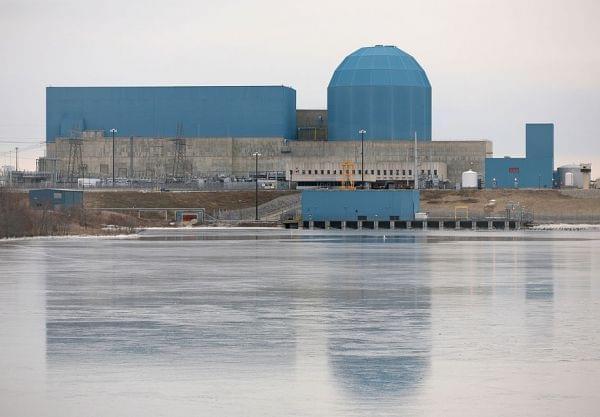Last-Minute Exelon Subsidy Plan Goes To Illinois House Floor

Exelon's nuclear power plant in Clinton, which is currently slated to close in June 2017. Wikimedia Commons
Illinois legislators could vote on their last day in session to approve a compromise measure to keep open Exelon nuclear plants in Clinton and the Quad Cities. Critics call it a multibillion-dollar "bailout". But State Senator Chapin Rose is among those endorsing late changes to a bill intended to save 14-hundred jobs at the two facilities.
The Mahomet Republican says Governor Bruce Rauner played a huge role in those changes. They include placing a ‘hard cap’ on residential and business rate hikes. The amendment will have an maximum average monthly impact of 35-cents a month for Ameren customers and 25-cents for ComEd customers.
But the average increase for Ameren customers, with is 12-cents a month.
"Ameren Illinois pushed for additional consumer protections during our negotiations with the sponsors," said company spokesperson Marceyln Love. "We're pleased to see those measures have been added and we remain supportive of the bill."
Senate Bill 2814 provides about $235 million a year to Exelon for the carbon-free nuclear power it generates - similar to subsidies wind-and solar-energy industries get. And it reduces rebates for efficient solar-energy programs.
The House Energy Committee approved the deal worth hundreds of millions of dollars annually on a 9-1 vote Wednesday night. It's readied for a House floor vote Thursday - the last day of the fall legislative session.
Rose says failing to support this measure comes down to simple economics. Citing recent studies of the bill, Rose says if the bill fails, Exelon will close its nuclear plants, the electricity supply will drop and electric rates could go up even more than they would under the legislation.
“There’s no way around this. The University of Illinois has concluded this, the Illinois Commerce Commission has concluded this," he said. "I am of the opinion that irrespective of the jobs in Clinton that are huge to our area – the economic impact to our area of the Clinton power station. Irrespective of that for the state of Illinois, the cost of doing nothing is terrible.”
But the Rauner administration did not support the bill publicly at an Illinois House hearing. And it's not responded to repeated media inquiries about where Rauner stands.
That has some state legislators on edge. Linda Chapa LaVia (D-Aurora) heads the House Energy Committee.
“It has happened in the past where we get to a point where it gets to the governor’s desk, and then we take a wrong direction," she said.
In a statement, Exelon Executive Vice President Joe Dominguez says the utility commends Rauner for maintaining many of the benefits in the bill, and “providing a shot in the arm to Illinois’ economy.”
The Illinois Clean Jobs Coalition says passing this bill would be a "victory for residential customers."
The deal took weeks of intense negotiations. But consumer groups are still nervous about the potential downsides.
Susan Satter is with the Illinois Attorney General's office. Her boss has opposed previous versions of the Exelon deal. Satter told legislators she was not yet ready to weigh in on the latest proposal.
“This is a wildly complicated effort, and we just simply have not had the time to understand how it’s going to work," she said.
With no clear end to Illinois' budget impasse after failed meetings between leaders this week, Sen. Rose says he hopes the recent compromise on the Exelon measure "can serve as some kind of a template to further negotiations on the budget."
Links
- Exelon/ComEd Offers Compromises In Nuclear Plant Legislation Talks
- Exelon to ‘Move Forward’ On Closure Of Clinton, Quad Cities Nuclear Plants
- Rauner & Area Officials To Meet To Discuss Exelon Proposal To Protect Clinton, QC Nuclear Plants
- State Rep. Mitchell Pleased Rauner Admistration Weighing In On Exelon Bill
- Changes To Measure To Help Exelon Plants
- Exelon Holds Out Hope For Legislative Solution
- Exelon Proposal; Brexit Implications; ‘A Prairie State Of Mind’ With Larry Kanfer
- Rauner, Lawmakers React To Exelon Closures
- Exelon Defers Decision To Close Clinton Plant For One Year
- Exelon: Auctions Didn’t Help Future Of Clinton Plant
- Text of Senate Bill 2814

